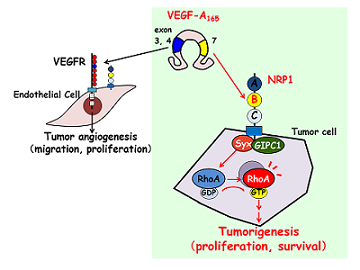Research projects
1. VEGF-A induces VEGFR-independent signaling, Neuropilin dependent Tumorigenesis.

Tumor-secreted Vascular endothelial growth factor-A (VEGF-A) is a crucial factor for tumor angiogenesis and tumor malignancy. Besides the aspect of tumor angiogenesis, there are reports to account that VEGF-A may promote proliferation and survival of tumor themselves. We are investigating the molecular mechanisms whereby VEGF mediates tumor progression. Anti-VEGF antibodies (such as Avastin) have received much attention lately for their ability to block tumor angiogenesis and prolong the life of cancer patients. Neuropilins (NRP1 and NRP2) are receptors for the VEGF family of angiogenesis stimulators. Previously, it was shown that VEGFs act via VEGF receptor tyrosine kinases, but it now appears that VEGF activity is also modulated by NRPs, which have no kinase activity.
We focus on developing new antitumor agents, which target the VEGF/NRPs mediated cell signaling in malignant tumor cells.
Contact:
Misuzu (Kurokawa) Seo, PhD Professor
〒603-8555
Kamigamo, Motoyama, Kita-ku, Kyoto city
Tel: 81-75-705-1488
E-mail: mseo@cc.kyoto-su.ac.jp
